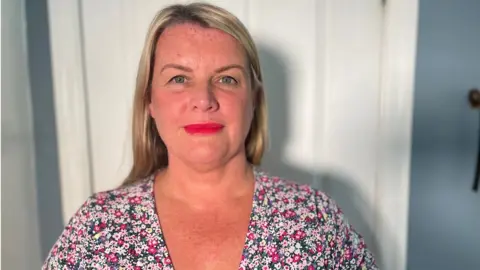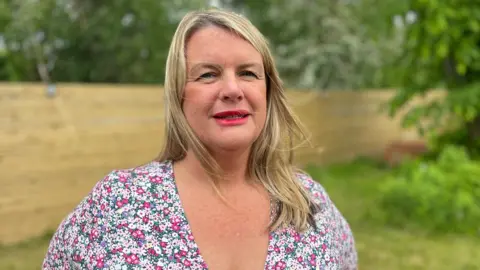Inflexible NHS is forcing nurses out, union warns
 BBC
BBCA nursing union has warned some nurses are retiring when they do not want to because of a lack of flexibility from Scotland's health boards.
Latest figures show nearly one in 10 nursing and midwifery posts are vacant.
The Royal College of Nursing Scotland says health boards failing to accommodate staff who want to change their working patterns rather than leave is making the problem worse.
Scottish ministers say they are working to increase flexibility for nurses.
The overall number of vacant nursing and midwifery posts across Scotland at 31 March this year was 6,209.
This is up from 4,495 at the same point in 2021, an increase of more than 38%.
RCN Scotland says the issue of retaining staff is equally as important as hiring new people to fill these vacancies.
The union is concerned about a "retire and rehire" trend where nurses leave their posts and then join staffing banks in order to get the reduced hours or flexibility they want.
RCN Scotland director Colin Pullman said: "People are wanting to continue in a flexible way but, for whatever reason, these opportunities are not being looked at so we're missing the opportunity to retain expertise and knowledge in the service.
"We just need to be a bit more creative, work with people and make sure their work-life balance is right.
"We have over 6,000 vacancies in the NHS so employers need to work with individuals who are either retiring or wish to come back into service, to give them the flexible option that they are looking for."
Nursing and Midwifery Council data shows the number of people leaving its permanent register in Scotland has increased for the first time after two years of decline.
Drive to increase flexibility
In 2021/22 a total of 2,750 people left the council's register, a 16.3% increase on the tally for 2020/21.
NHS workforce statistics show spending on bank nurses between 2014 and 2022 increased by 36% to £321m, with spend on agency nurses more than doubling (126.2%) to £88.9m in the same period.
Much of this increase was as a result of the pandemic where there was more reliance on temporary staff.
Speaking on BBC Radio's Good Morning Scotland programme on Monday, Health Secretary Humza Yousaf said the Scottish government and health boards were "putting in a lot of effort" to improve conditions for staff who he said had been left "completely knackered" from dealing with the pandemic.
He said: "Recruitment is one side of the story, the other side of the story is retention.
"I have spoken to a number of nurses who tell me that having worked 30 years in the NHS they are really struggling to stay on.
"I have asked my chief nursing officer to look at whether we can be more flexible right across the board in terms of working patterns and working shifts."

'I didn't want to retire'

Johanna Black was overwhelmed with the cards and warm messages she got when she retired from her role as a community nurse in East Dunbartonshire last year.
The 55-year-old had worked in the NHS for 37 years so was in a position to start receiving her NHS pension and look for another nursing role with reduced hours.
But it was not what she wanted to do.
"If it hadn't been for Covid I would have kept my job," she said.
"I loved my job, worked in a great team and was really proud of the service we provided, especially in the pandemic, but I would say the past two years have impacted my health.
"I think I may have been able to negotiate a slight reduction in my hours but financially I wasn't in a position to do that, so my only option was to retire so I could pick up work with less hours that I could cope with."
 Johanna Black
Johanna BlackJohanna has ended up temporarily back in the same senior charge nurse role she retired from, with reduced hours, but thinks the future will involve doing bank nursing shifts.
The 55-year-old thinks there "should be more options" for NHS staff in her position as she argues "a lot of people still have a lot to give".
She said: "I think people, if they have various options open to them, they might not choose to leave."
Johanna said she was not critical of NHS Forth Valley but added that all of Scotland's health boards "need to think what can be done to retain that experience."

The Scottish government said staffing across NHS Scotland was at a record high.
Health Secretary Humza Yousaf said: "Since 2006 we have increased the number of qualified nurses and midwives by over 5,500, or by 13.7%; the number of medical and dental consultants by over 2,000, or by 63.2%, and the number of allied health professionals (excluding paramedics) by over 2,000, or by 26.3%.
"The latest workforce statistics also showed that nursing and midwifery vacancies have started to reduce in the last quarter.
"We have recruited more than 1,000 additional healthcare support staff since last October and almost 200 registered nurses from overseas to help address the unprecedented challenges facing the NHS."
He said work was ongoing to enhance NHS workforce levels and support health boards to fill posts.
Mr Yousaf added: "This is backed by our £1bn NHS recovery plan which introduced a range of direct workforce investments and new measures to support health boards' capacity for both domestic and international recruitment."
